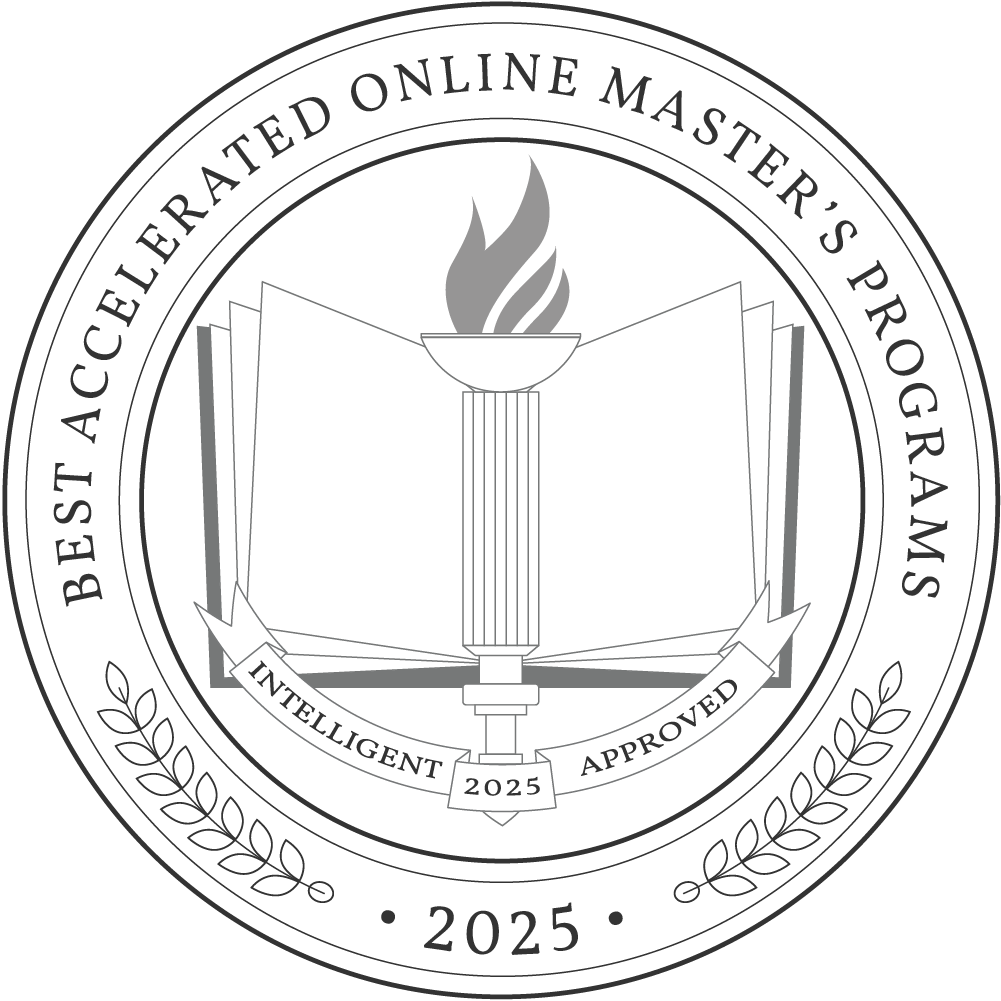Having a master’s degree can help individuals unlock new job opportunities, increase earning potential, and prepare them for doctoral study.
Traditional master’s degrees require two to three years of full-time study to complete, but for those looking to earn their graduate degree faster, an accelerated online master’s degree may be an ideal option. These programs function in various ways, but all aim to help students earn their master’s degree as quickly as possible.
Intelligent.com compiled this list of the best accelerated online master’s degree programs to help prospective graduate students find the program that best suits their needs. We also interviewed Blanca Villagomez, a program counselor and coordinator at UC-Irvine, for her insights into what students can expect from an accelerated online master’s degree and how to select the right program.
Why Trust Us
The Intelligent.com Higher Education Team is dedicated to providing students with independent, equitable school and program rankings and well-researched resources. Our expert-driven articles cover topics related to online colleges and programs, paying for school, and career outlooks. We use data from the U.S. Department of Education’s College Scorecard, the National Center for Education Statistics, and other reputable educational and professional organizations. Our academic advisory team reviews content and verifies accuracy throughout the year for the most current information. Partnerships do not influence rankings or editorial decisions.
- Analyzed over 2,000 national, accredited, and nonprofit colleges and universities
- 800+ rankings pages are reviewed and updated yearly
- Content is informed by reputable sources, surveys, and interviews with academic advisors and other experts
- Over 100 data points are reviewed for accuracy and quality throughout the year, including sources
How we rank schools
Our list features the best online Master’s degree programs at top colleges nationwide. Each school featured is a nonprofit, accredited institution — either public or private — with a high standard of academic quality for post-secondary institutions.
We evaluated each school’s program on tuition costs, admission, retention and graduation rates, faculty, reputation, and the student resources provided for online students. We collected data from trusted sources like the National Center for Education Statistics, individual school and program websites, school admissions counselors, and other data sources. Then, we calculated the Intelligent Score on a scale of 0 to 100 based on the following criterion:
Academic Quality:
- Admission rate versus enrollment rate
- Retention rate of students who return after year one
- Accreditation status (regional and programmatic)
- Nonprofit status, both private and public institutions
Graduation Rate
- Overall graduation rate
- Total number of currently enrolled students, including diversity metrics
- Student-to-faculty ratio
Cost and ROI
- In-state and out-of-state per-credit tuition rates and fees
- Required credits to graduate
- Earning potential after graduation
- Availability of federal student loans, scholarships, and other financial aid options
Student Resources
- Available student services for online-only and hybrid programs
- On-campus amenities like tutoring centers and the number of libraries
Read more about our ranking methodology.
The 40 Top Accelerated Online Master’s Degree Programs
FiltersInstitution Type
Status
- Intelligent Score
- Alphabetically By University Name
- Acceptance Rate
- Enrollment
- In-state Graduate Tuition
- Out-of-state Graduate Tuition
- In-state Undergraduate Tuition
- Out-of-state Undergraduate Tuition

Southern New Hampshire University
Intelligent Score: 98.96In-state: $9,600
Out-of-state: $9,600
In-state: $18,810
Out-of-state: $18,810
SAT: N/A
ACT: N/A
$637
Online
New England Commission of Higher Education
30-45
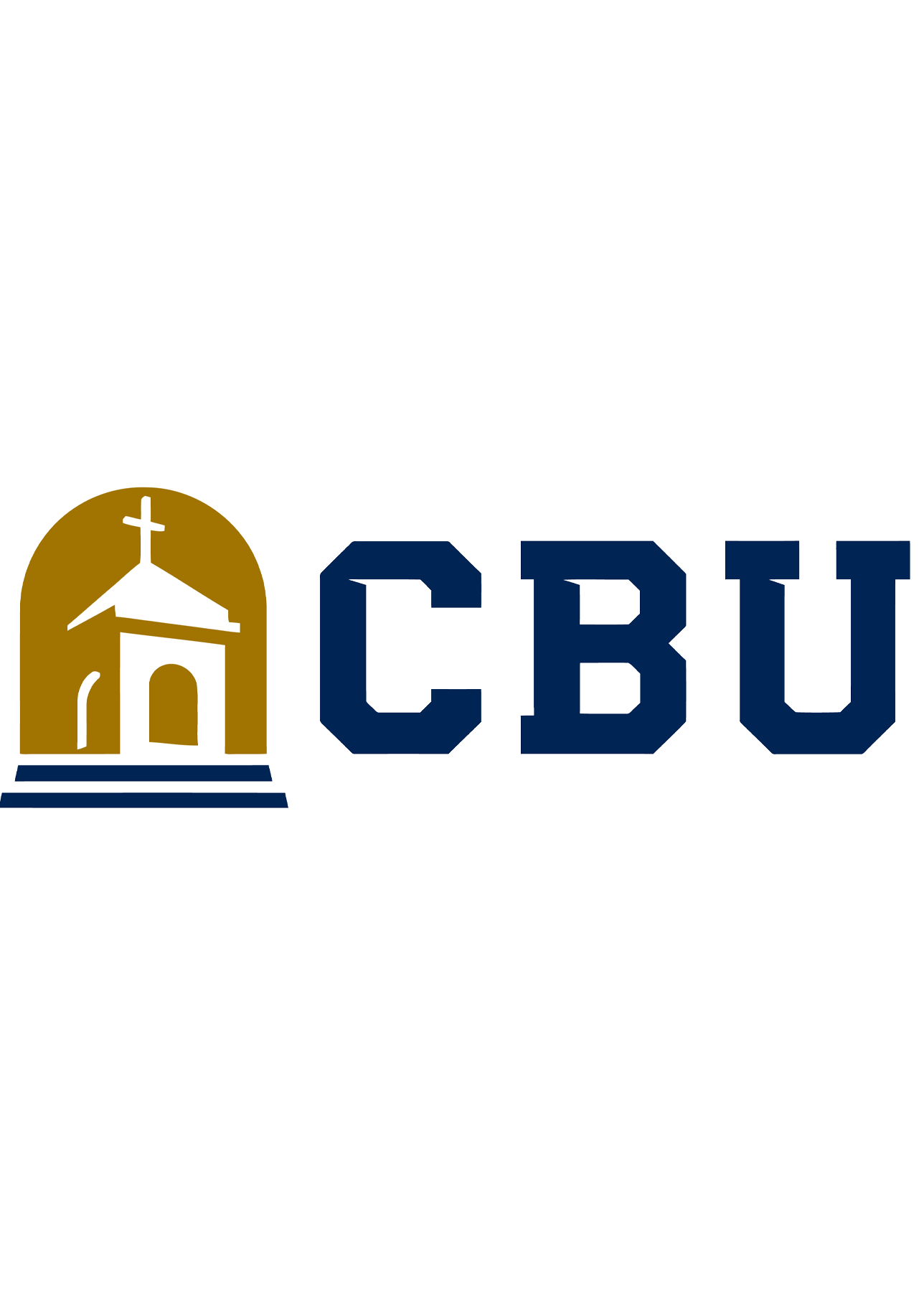
California Baptist University
Intelligent Score: 98.91In-state: $33,930
Out-of-state: $33,930
In-state: $13,410
Out-of-state: $13,410
SAT: 960-1150
ACT: 18-25
$580 - $815
Online
Western Association of Schools and Colleges Senior College and University Commission
30-68

The University of Texas Rio Grande Valley
Intelligent Score: 97.81In-state: $11,448
Out-of-state: $40,032
In-state: $12,028
Out-of-state: $12,028
SAT: 1210-1470
ACT: 26-33
$444 - $472
Online
Southern Association of Colleges and Schools Commission on Colleges
30-36

University of North Texas
Intelligent Score: 97.76In-state: $8,295
Out-of-state: $18,111
In-state: $6,350
Out-of-state: $6,350
SAT: 1050-1240
ACT: 20-27
Resident: $353
Non-Resident: $813
Online
Southern Association of Colleges and Schools Commission on Colleges
30-36

Ball State University
Intelligent Score: 97.69In-state: $9,482
Out-of-state: $26,470
In-state: $9,328
Out-of-state: $9,328
SAT: N/A
ACT: N/A
In-State: $464
Out-of-State: $696
Online
Higher Learning Commission
30-39
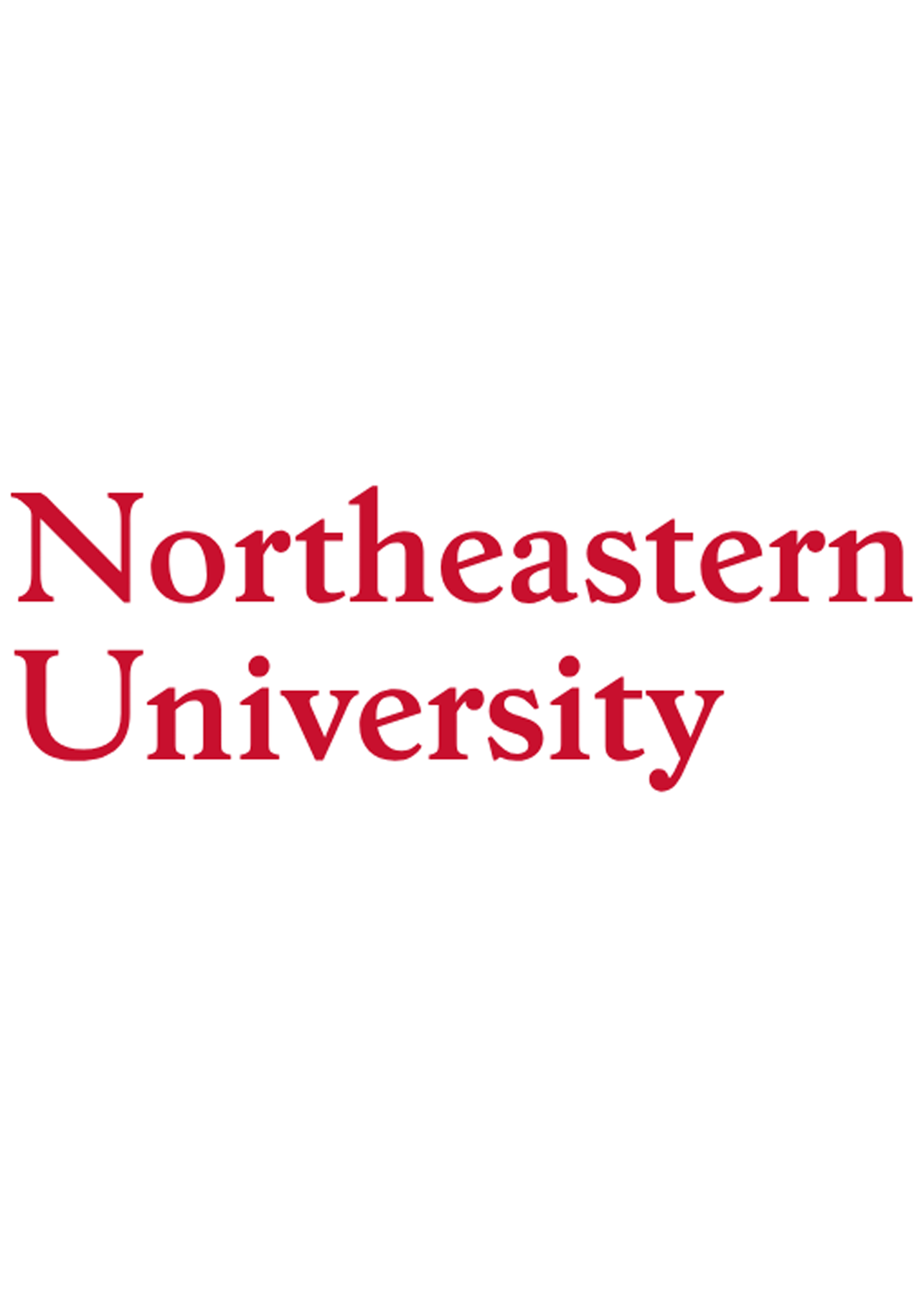
Northeastern University
Intelligent Score: 94.91In-state: $54,360
Out-of-state: $54,360
In-state: $25,264
Out-of-state: $25,264
SAT: 1410-1540
ACT: 33-35
$850 - $960
Online
New England Commission of Higher Education
30-42

The University of Texas Permian Basin
Intelligent Score: 92.79In-state: $11,448
Out-of-state: $40,032
In-state: $12,028
Out-of-state: $12,028
SAT: 1210-1470
ACT: 26-33
$391
Online
Southern Association of Colleges and Schools Commission on Colleges
30-45

Western Governors University
Intelligent Score: 91.46In-state: $6,380
Out-of-state: $6,380
In-state: $7,500
Out-of-state: $7,500
SAT: N/A
ACT: N/A
$528
Online
Northwest Commission on Colleges and Universities
34

University of Alabama
Intelligent Score: 89.99In-state: $10,780
Out-of-state: $30,250
In-state: $10,780
Out-of-state: $10,780
SAT: 1070-1330
ACT: 23-31
$440
Online, On-Campus
Southern Association of Colleges and Schools Commission on Colleges
30-33
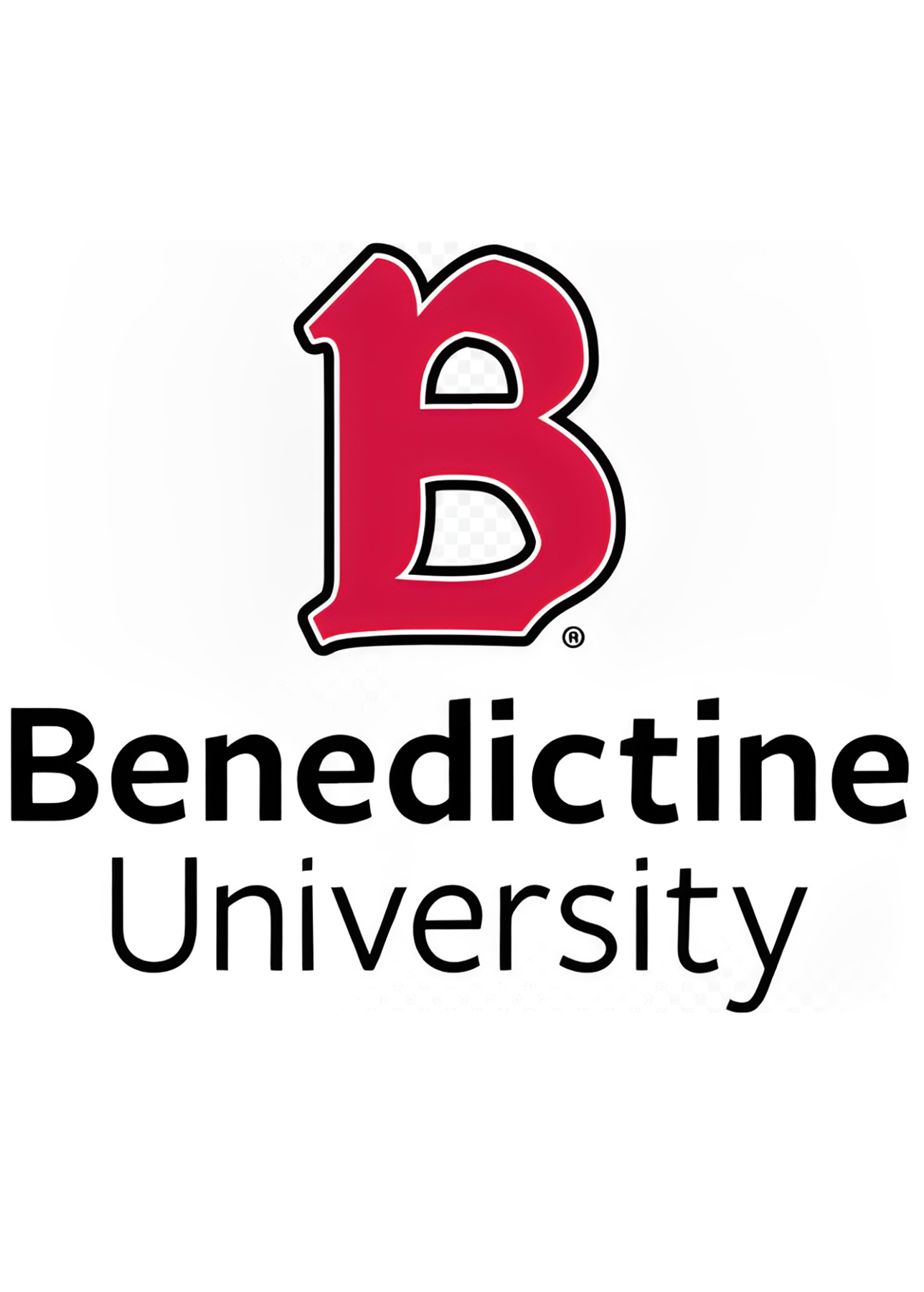
Benedictine University
Intelligent Score: 89.29In-state: $30,830
Out-of-state: $30,830
In-state: $18,574
Out-of-state: $18,574
SAT: 980-1160
ACT: 19-26
$800
Online, On-Campus
Higher Learning Commission
30

Colorado State University
Intelligent Score: 89.05In-state: $9,426
Out-of-state: $28,147
In-state: $10,520
Out-of-state: $10,520
SAT: 1070-1280
ACT: 23-29
$448
Hybrid
Higher Learning Commission
90

Trine University
Intelligent Score: 88.54In-state: $32,990
Out-of-state: $32,990
In-state: $41,457
Out-of-state: $41,457
SAT: 1010-1210
ACT: 20-27
$575
Hybrid
Higher Learning Commission
30
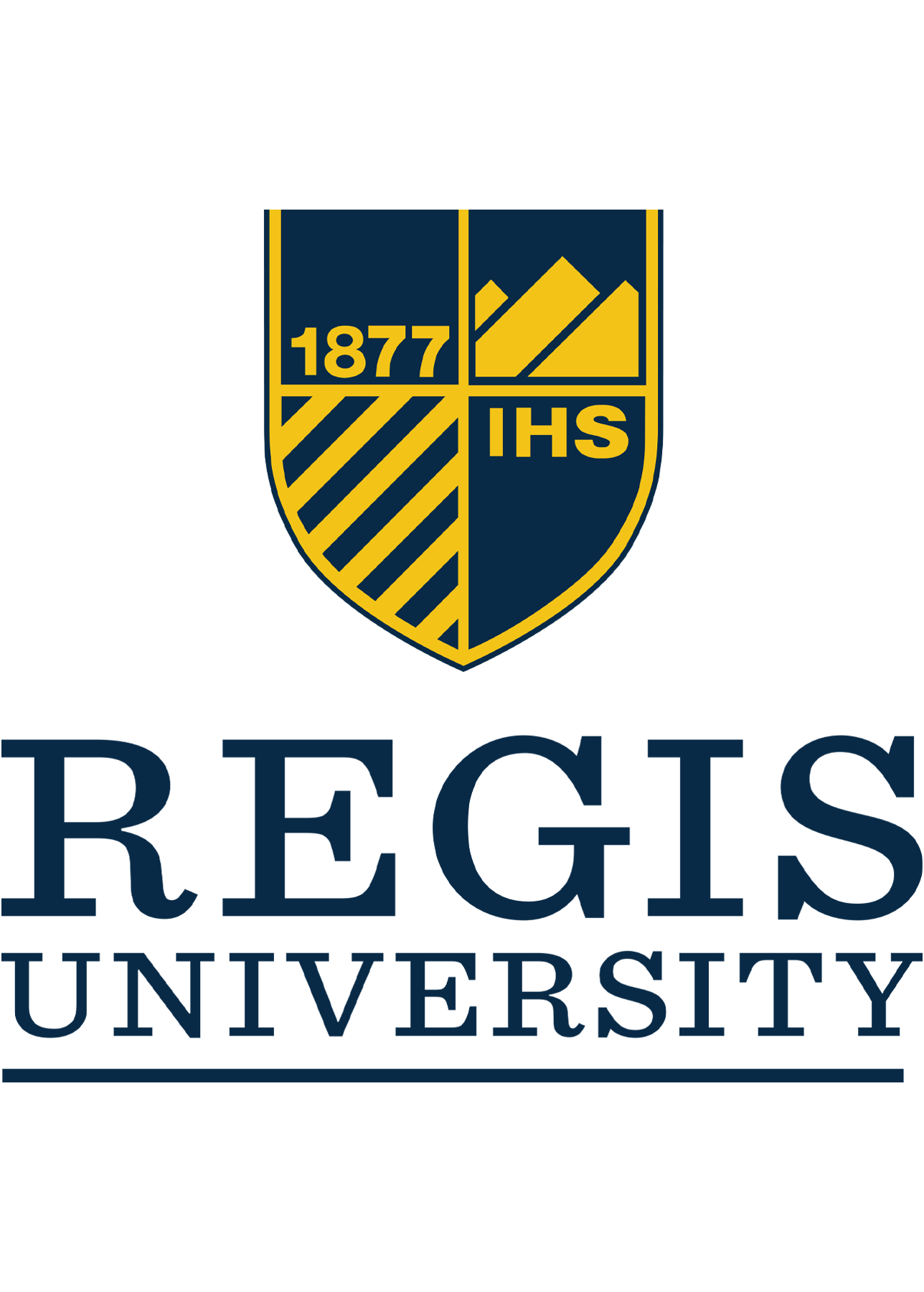
Regis University
Intelligent Score: 88.47In-state: $38,208
Out-of-state: $38,208
In-state: $14,322
Out-of-state: $14,322
SAT: 1000-1220
ACT: 21-28
$599 - $1,051
Online
Higher Learning Commission
33-36

Arkansas State University
Intelligent Score: 87.13In-state: $5,232
Out-of-state: $10,800
In-state: $4,986
Out-of-state: $4,986
SAT: 1000-1220
ACT: 20-26
$340 - $514
Online
Higher Learning Commission
30-39

Anderson University
Intelligent Score: 86.95In-state: $26,820
Out-of-state: $26,820
In-state: $10,140
Out-of-state: $10,140
SAT: N/A
ACT: N/A
$415 - $580
Online
Southern Association of Colleges and Schools Commission on Colleges
36-45

Baker University
Intelligent Score: 86.24In-state: $30,170
Out-of-state: $30,170
In-state: $11,124
Out-of-state: $11,124
SAT: 950-1130
ACT: 19-24
$366
Online
Higher Learning Commission
30

Lamar University
Intelligent Score: 85.98In-state: $6,129
Out-of-state: $15,945
In-state: $6,397
Out-of-state: $6,397
SAT: 943-1140
ACT: 17-23
$342 - $438
Online
Southern Association of Colleges and Schools Commission on Colleges
30-42
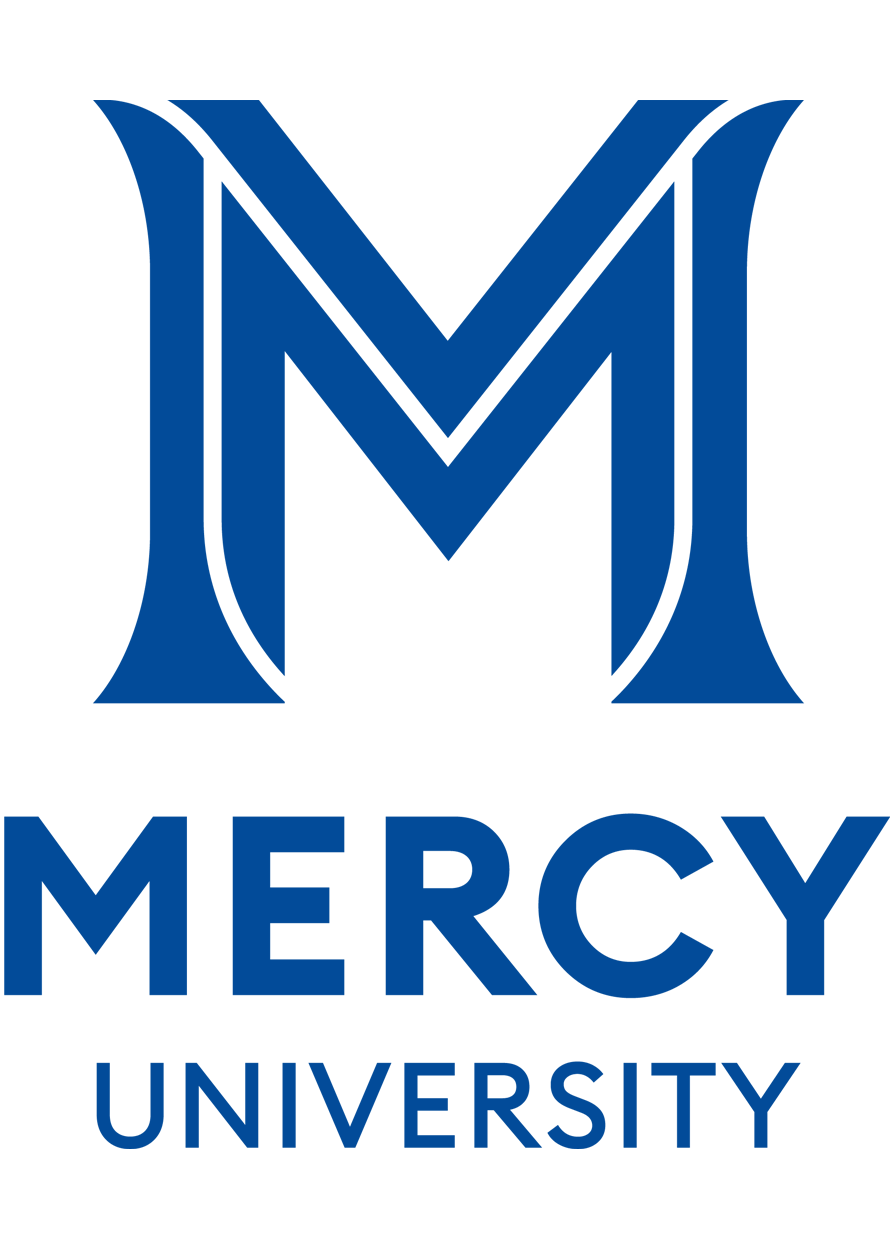
Mercy University
Intelligent Score: 84.14In-state: $40,712
Out-of-state: $40,712
In-state: $47,865
Out-of-state: $47,865
SAT: 1020-1230
ACT: 23-27
$1,040
Online, On-Campus
Middle States Commission on Higher Education
36
What Is an Accelerated Online Master’s Degree Program?
Accelerated online master’s degree programs come in a variety of formats. Some combine bachelor’s and master’s coursework, allowing students to earn both degrees in as little as five years. These are typically known as “4+1” programs and are available in a variety of areas, such as nursing and social work.
Other programs accelerate learning by compressing the coursework from a traditional master’s program into a shortened time frame. For traditional master’s programs, 12 credits is typically considered a full-time courseload, but an accelerated program may require students to take up to 18 credits per term. These types of programs may also operate on a year-round schedule rather than giving students the traditional summer break between spring and fall semesters.
At the master’s level, students may also be eligible for accelerated programs that waive course requirements based on their prior professional experience. Students interested in these types of programs should inquire about the eligibility requirements and what they must do to demonstrate their proficiency in core curriculum areas.
Yet another type of accelerated master’s program are self-paced programs that allow students to move through their coursework as quickly as they like. These are typically considered competency-based programs, in which students can progress through their classes by demonstrating that they’ve mastered concepts and skills according to their own schedule.
What You Should Know About Accelerated Online Master’s Degrees
For students prioritizing the quick completion of their degree, an accelerated bachelor’s degree may seem like the ideal solution. However, there are key points to keep in mind about how these degree programs work and how to find a quality program.
Pacing and workload
The number of credits for a master’s degree varies by program, although the majority require between 30-60 credits. Traditional master’s degree programs are typically designed to be completed in two to three years of full-time study, with full-time students completing 18 credits per academic year.
Accelerated programs are a fast-track to earning a master’s, Villagomez says. They compress all the required credits into a shortened time frame through various methods. These can include accepting a higher number of previously earned credits, faster-paced classes, more classes per term, and fewer breaks in the academic calendar.
However, Villagomez offers some words of caution for students considering an accelerated degree.
“There are no shortcuts with this route,” she says. “Students are expected to complete the same amount of work as they would in a traditional program in a shorter time frame. They require a higher investment of time and energy every week. Therefore, I usually only recommend them to individuals with strong time management skills, dedication, and discipline.”
Degree completion programs
Many programs that advertise themselves as accelerated are actually degree completion programs, which are designed for students who have already earned some college credits. By accepting up to half of the required credits for a degree, these types of programs allow students to finish their master’s in as little as a year or less.
Each school sets its own policies for degree completion programs. Students should consult with an admissions or transfer counselor to help them determine if they are eligible for one.
Class schedules
Because of their fast-paced nature, accelerated programs typically rely on asynchronous classes. With this delivery format, there are no scheduled class meetings. Instead, students can access pre-recorded lectures, videos, and reading assignments anytime, allowing them to complete their schoolwork on the schedule that’s most convenient for them.
While the flexibility of asynchronous classes makes learning more accessible, students must be comfortable learning autonomously and have strong self-motivation, time management, and discipline skills in order to be successful.
Accreditation
Whether you’re attending a traditionally paced or accelerated program, it’s important to verify the accreditation status of any institution you’re considering attending.
“Attending a non-accredited college can negatively impact future post-graduate opportunities such as employment and doctorate programs,” Villagomez says. “With institutional accreditation, schools are evaluated as a whole and must pass several standards to receive a regional or national accreditation. Programmatic accreditations evaluate the quality and legitimacy of the specific degree programs offered at institutions.”
One way to verify accreditation is to use the U.S. Department of Education’s online accreditation database. If you need help, meet with an academic advisor on your current campus to help you during this process. They may have helpful insight into other resources you can use to verify the legitimacy of an institution.
There are two types of accreditation for U.S. colleges and universities, regional and national. Both are designed to assess the quality of education at institutions, although regionally accredited schools are held to more rigorous standards.
You can find more information about a school’s accreditation status by visiting their website, speaking to an admissions counselor, or searching for a school in the U.S. Department of Education’s accreditation database.
Non-profit and for-profit status
Students should also be aware of whether the schools they’re considering are non-profit or for-profit. This status can impact the quality of a school’s programs, how the institution spends its money, and your financial aid eligibility and future employment opportunities.
As the name implies, for-profit schools are designed to earn money, which may mean that providing quality education may take a backseat to boost revenue. For-profit schools can spend their revenue however they want, which can result in underinvestment in students and resources.
Meanwhile, non-profit institutions are required to reinvest their revenue into the school in the form of faculty and staff salaries, infrastructure, student services, and other resources. All public and many private two- and four-year colleges in the U.S. are non-profits.
All of the schools on our list are non-profits. If you’re considering a for-profit school, be sure to carefully research their business practices, graduation rates, and outcomes for graduates.
Eligibility and restrictions
While online learning has removed geographic barriers to earning a degree, there are some limitations on who can attend which schools and programs. In the U.S., institutions must be authorized by individual states to grant degrees to students living in those states. Without this authorization, non-resident students are ineligible to enroll in the institution. Currently, over 2300 institutions throughout 49 states, Washington D.C., Puerto Rico, and the U.S. Virgin Islands participate in the National Council for State Authorization Reciprocity Agreements (NC-SARA), ensuring their distance education programs are authorized to operate and grant degrees in multiple states.
Other restrictions may apply to a student’s specific area of study. For example, teachers in the U.S. must be certified by the state in which they wish to teach. Depending on the state, students might be required to earn their degree in the state in which they want to get certified. Keep professional plans in mind when exploring your program options, and if you’re unsure of your eligibility for a particular school or program, speak to an admissions counselor for clarification.
Pros and Cons of Accelerated Online Master’s Programs
There are several advantages to attending an accelerated online master’s degree program. However, students should also be aware of the challenges that these types of programs present and understand that they may not be a good fit for everyone.
Pros
-
Earn your degree faster:
The obvious benefit of enrolling in an accelerated online master’s program is that it allows students to finish their graduate education faster. Depending on the specific program, students may be able to graduate in as little as 12-18 months, compared to traditional master’s programs, which typically take two to three years of full-time study or three to four years of part-time study.
-
Attend classes on your own schedule
In order to allow students to finish faster, most accelerated master’s programs rely on asynchronous learning, in which lessons and assignments are available 24/7 through videos, pre-recorded lectures, reading assignments, and more. Students can complete their coursework whenever it is most convenient for them. This may also make it easier for students to earn a master’s degree while balancing other work and life responsibilities.
-
Save money
Online degree programs eliminate certain costs associated with higher education, such as room and board and transportation. The ability to learn remotely means students can choose to live in an area with a lower cost of living than where their school is located. Additionally, if they are able to waive certain course requirements due to previous work or educational experience, this can lower the overall cost of tuition.
Cons
-
Pace of learning may not suit all students
In most cases, students in accelerated programs must still complete the same number of courses as students in traditional programs, just at a much more rigorous pace. This can mean an even greater commitment of time and energy in the short term, which may not work for all students.
-
Networking opportunities may be lacking
One key reason to attend a master’s degree program is to make professional connections, which can be tougher in an online environment. When researching programs, students should inquire about what types of networking opportunities are available to online students.
How to Succeed in an Accelerated Degree Program
A high GPA is often needed to get into an accelerated degree program, and you will likely need to maintain a high GPA in order to stay in the program as well. If your GPA falls below 3.0, most accelerated programs won’t allow you to take any more graduate courses until you get your grades up.
The following methods can help you study more effectively and improve your GPA:
- SQ3R: This learning system involves five steps — survey (skim through course materials before you read them), question (ask yourself questions based on this survey, such as what the course material is about and whether you already know this information), read (fully read the material and look for answers to your questions), recite (summarize in your own words what you have just read), and review (re-read any portions of the material that you didn’t fully understand). SQ3R is much better for retaining information than simply reading course materials.
- The Leitner System: Sebastian Leitner was a science journalist who wrote a bestselling book on the psychology of learning, and his system for memorizing subjects involved making flashcards and storing them in a series of five boxes. All of the cards start in Box 1. If you get a card right, move it into the next box. If you get it wrong, move it down a box. Review Box 1 every day, Box 2 every two days, Box 3 every four days, Box 4 every nine days, and Box 5 every 14 days. This method is based on the theory of spaced repetition, which has been proven to help students learn subjects faster.
- The Pomodoro Technique: Do you find it hard to focus while studying? This time management system involves following every 25 minutes of study with a 5-minute break. Once you’ve completed four intervals, you can take a longer break of 15 to 30 minutes. It’s much easier to resist distractions when you only commit to studying for 25 minutes at a time.
You should also remember that getting good grades involves more than just studying. The highest-performing students typically stick to a schedule, exercise regularly, eat a balanced diet, and get enough sleep. By staying organized and healthy, you’ll be able to support the mental state needed for optimal academic performance.
How to Choose the Online Accelerated Master’s Degree Program That’s Right For You
Below are the five key steps in selecting an online accelerated master’s degree. Please note that many of these steps overlap, and some are ongoing throughout your higher education journey.
Step 1: Make sure the field of study you choose is right for you
“Students should be proactive in their career exploration and stay open-minded about the different ways they can receive exposure to new knowledge,” Villagomez says. “Students are often surprised when they learn that exploration is an ongoing process that takes time and intentionality.”
Consider your reasons for wanting a master’s degree. Perhaps it’s a requirement to be eligible for certain jobs, like social worker or nurse practitioner. Maybe you already have a bachelor’s degree in one field, but want to pivot to another profession and need additional education. Or you may be interested in deepening your skills in an area in which you already have a degree or professional experience. Your reasons for getting a master’s degree will help guide you to the programs that offer the type of curriculum and skill development that’s right for you. You may also find that a different type of educational path, such as a post-secondary certificate or bootcamp is sufficient.
Step 2: Research schools and programs
“When it comes time to research programs, I recommend students develop a list of custom filters to narrow down options,” Villagomez says. “Some examples of filters include curriculum requirements, duration of program, faculty reputation and ranking, and professional development opportunities offered.”
Researching the program’s faculty and support services will help you determine its quality. “Due to the fast pace of an accelerated program, it’s important to know how your professors and the school will support your education and help you with any challenges you may face along the way,” Villagomez says. “Find out if they have reputations for being accessible, reliable, and supportive. Support systems vary across institutions, so understanding who you have access to is a proactive way to take care of your future self.”
Students should also investigate the program’s curriculum to ensure it aligns with their future career goals. For example, if your field of study requires student teaching, an internship, or clinical residency, confirm that the program’s curriculum accounts for these in-person requirements.
This information is often available on the school’s website. For more information, you can also follow schools and programs on social media, speak to admissions representatives, and attend virtual open houses.
Step 3: Prepare for tests and applications
“After conducting research on the degree programs and schools that are the best fit for them, students should have a strong sense of the admission requirements,” Villagomez says. “It’s important for students to stay organized with a comprehensive and detailed checklist to track their progress, submit all required materials, and meet deadlines.”
Specific application requirements and processes will vary by school, but the common elements of an application for a master’s degree include:
- Completed application and required fees
- Official transcripts from all undergraduate colleges attended
- Letters of recommendation
- Resume or CV
- Personal statement
- GRE or GMAT scores
Take note of application deadlines, as many accelerated programs offer multiple start dates throughout the academic year. It’s best to stay on top of deadlines to ensure you can start the program when you plan to.
Step 4: Select your program
With all this information in hand, you should be ready to select the program or programs you’ll apply to. Like most other aspects of this process, the right number of schools to apply to is based on your personal needs and preferences. Some students are only interested in one specific program, while others may apply to multiple programs to increase their chances of acceptance. Either way, taking the time to research and prepare should help you choose the online accelerated bachelor’s degree that’s right for you.
Step 5: Determine how you’ll pay for your degree
This is also the point where you’ll want to start crunching some numbers. What’s the tuition at the schools you’re applying to? What kind of scholarships, grants, and other financial aid do they offer? What additional costs, like upgrading technology, should you budget for?
Speak to a financial aid counselor to get a realistic idea of what your bill will be like each term and your options for paying it. If you need loans to help pay for school, complete the Free Application for Federal Student Aid (FAFSA), which the U.S. Department of Education uses to determine eligibility for federal student loans, grants, and work-study. Individual schools also use the FAFSA to determine eligibility for need-based aid, such as institutional scholarships and grants. Students can also explore opportunities for scholarships through professional development organizations, private foundations and non-profits, community and religious groups, and more.
If you’re planning on working while earning a master’s degree, find out if your employer offers any kind of tuition assistance benefits, which can help offset education costs. Individuals who are veterans or active-duty military service members can inquire about their eligibility for GI Bill benefits.
